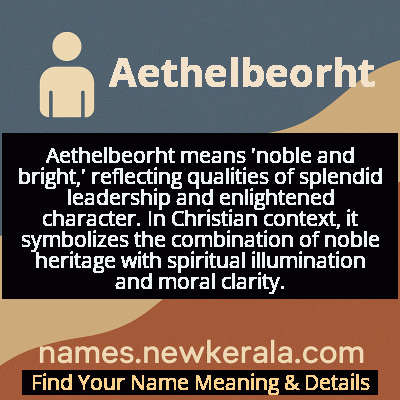Aethelbeorht Name Meaning & Details
Origin, Popularity, Numerology Analysis & Name Meaning of Aethelbeorht
Discover the origin, meaning, and cultural significance of the name AETHELBEORHT. Delve into its historical roots and explore the lasting impact it has had on communities and traditions.
Name
Aethelbeorht
Gender
Male
Origin
Christian
Lucky Number
2
Meaning of the Name - Aethelbeorht
Aethelbeorht means 'noble and bright,' reflecting qualities of splendid leadership and enlightened character. In Christian context, it symbolizes the combination of noble heritage with spiritual illumination and moral clarity.
Aethelbeorht - Complete Numerology Analysis
Your Numerology Number
Based on Pythagorean Numerology System
Ruling Planet
Moon
Positive Nature
Diplomatic, friendly, artistic, empathetic.
Negative Traits
Over-sensitive, moody, indecisive, prone to self-pity.
Lucky Colours
Green, cream, white.
Lucky Days
Monday.
Lucky Stones
Pearl, moonstone.
Harmony Numbers
1, 3, 4.
Best Suited Professions
Diplomats, mediators, caregivers, artists.
What People Like About You
Cooperative spirit, friendliness, artistic talent.
Famous People Named Aethelbeorht
Æthelberht of Kent
King
First English king to convert to Christianity and established the Gregorian mission in England
Æthelberht of East Anglia
King and Saint
Martyred king venerated as a saint for his Christian faith and leadership
Æthelberht of Wessex
King
Ruled Wessex and fought against Viking invasions, continuing the Christian legacy of his predecessors
Æthelberht of York
Archbishop
Influential church leader who contributed to the development of English Christianity and education
Name Variations & International Equivalents
Click on blue names to explore their detailed meanings. Gray names with will be available soon.
Cultural & Historical Significance
The name embodies the transition from pagan Germanic traditions to Christian civilization in England, representing both noble Germanic heritage and the new Christian identity. Throughout the Anglo-Saxon period, the name continued to be borne by kings, saints, and church leaders, cementing its status as a name of royal and religious importance that symbolized the fusion of Germanic nobility with Christian enlightenment. The name's persistence through multiple Anglo-Saxon kingdoms demonstrates its enduring appeal as a marker of Christian kingship and cultural leadership during England's formative centuries.
Extended Personality Analysis
Individuals named Aethelbeorht are typically perceived as possessing a natural nobility and leadership quality, combined with intellectual brightness and spiritual depth. They often exhibit strong moral convictions and a sense of duty, reflecting the name's historical association with Christian kingship and governance. These individuals tend to be principled decision-makers who balance tradition with progress, much like the original King Æthelberht who maintained Anglo-Saxon customs while embracing Christianity.
Their personality often combines practical wisdom with visionary thinking, enabling them to bridge different cultures or perspectives. They typically demonstrate resilience in adversity and a commitment to higher principles, whether in personal ethics, professional conduct, or spiritual matters. The name suggests someone who carries themselves with dignity while remaining accessible, possessing the charisma to inspire others while maintaining grounded practicality in their approach to challenges. This combination of noble bearing and intellectual/spiritual illumination creates a personality profile of someone both respected and approachable, traditional yet innovative.
Modern Usage & Popularity
In contemporary times, Aethelbeorht is extremely rare as a given name, primarily used by historical reenactors, medieval enthusiasts, or families with strong Anglo-Saxon heritage connections. The modern equivalents like Albert or Ethelbert see occasional use, particularly in Britain among families interested in historical names. The name experiences minor revivals during periods of increased interest in early English history or in academic circles studying the Anglo-Saxon period. Its usage is almost exclusively limited to those deliberately choosing archaic or historically significant names rather than following naming trends, and the complexity and archaic spelling make it impractical for everyday use in modern society, though simplified versions occasionally appear in genealogical research or historical fiction.
Symbolic & Spiritual Meanings
Aethelbeorht symbolizes the harmonious integration of noble heritage with spiritual enlightenment, representing the ideal of enlightened leadership. The name carries connotations of bridge-building between traditions and innovation, much like the historical King Æthelberht who connected pagan Anglo-Saxon culture with Christian civilization. It embodies the concept of 'noble brightness' - not just intellectual illumination but moral clarity and spiritual insight, suggesting someone who carries the wisdom of the past while embracing progressive ideals and serving as a conduit between different eras or cultures. Symbolically, it represents the transformation of raw power into enlightened authority, where strength is tempered by wisdom and leadership is guided by higher principles, creating a powerful symbolic union of earthly authority with heavenly inspiration.

